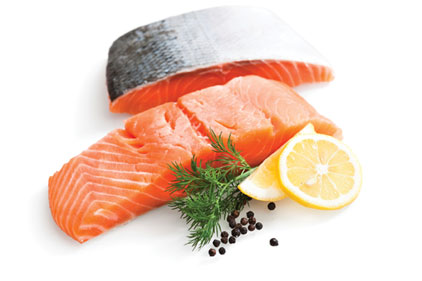The Inbox
|
They are considered essential, but the body cannot make them. They are found in numerous foods, but Americans, two thirds of whom are obese, fail to eat enough of them. They have a variety of health-related benefits, but a nutrition-conscious society still falls short in consuming proper amounts.
What are omega-3 fatty acids? Considered essential fatty acids, they are necessary for human health, but, with the human body unable to produce them, consumers need to obtain them through food. Omega-3s are found in a variety of fish species, including halibut, salmon and tuna, as well as other seafood, algae and krill, some plants and nut oils. It is one of the principal reasons the American Heart Association recommends eating fish (particularly, fatty fish: albacore tuna, herring, lake trout, mackerel, salmon or sardines) at least twice a week.
The reasoning is sound: Growing research links omega-3s to health. A review appearing in the Journal of Alzheimer’s Disease suggests omega-3 supplementation can help prevent Alzheimer’s Disease (AD), as several early clinical trials found “patients with very mild AD or mild cognitive impairment benefit from omega-3 FA (fatty acid) treatment, but none showed significant improvements in cognitive function in patients with moderate or advanced AD.”
The research out of the Netherlands does caution that omega-3 supplementation is not a short-term solution; far from it—the omega-3 fatty acids need to be used for a long term (longer than 10% of the lifespan).
Omega-3 benefits are not limited to cognition, however. Researchers at Tokyo’s Japan Women’s University found an omega-3 fish oil extract helps reduce inflammation and pain associated with arthritis. In addition, when combined with coenzyme Q10, the omega-3 eicosapentaenoic acid (EPA) may significantly reduce prostate-specific antigen levels in normal healthy men, according to a study from Iran and published in the British Journal of Nutrition.
EPA and docosahexaenoic acid (DHA) are two primary types of omega-3s and the ones found in fish and seafood. A third, alpha-linolenic acid (ALA), is in flax seed, soybean oil, walnuts and some green vegetables (spinach and kale among them). The Council for Responsible Nutrition reports 21% of U.S. adults use omega-3 fish oil supplements, putting it as the nation’s third most popular supplement, behind only multivitamins and vitamin D. Nevertheless, some consumers have been hesitant to turn to omega-3 fatty acids, due to their often fishy origins. Virginia Tech researchers have potentially found a solution.
Their research suggests food scientists could add fish oil to milk, to provide all the benefits of omega-3s, but their effort did not compromise the drink’s flavor. The researchers asked 25 participants to drink 1oz cups of standard 2% milk and skim milk with 78 parts butter and 22 parts fish oil; they found the participants did not notice a difference.
“We couldn’t find any aroma differences,” said Susan E. Duncan, a professor of food science and technology in the College of Agriculture and Life Sciences. “We were concerned the fish oil would undergo a chemical process called oxidation, which would shorten the milk’s shelflife, or the milk would acquire a cardboard or paint flavor by reacting with the fish oil. It appears we have a product that is stable, with no chemical taste or smell issues.”
Of course, the research is preliminary and of a fairly small sample set, but it demonstrates that omega-3s are well on their way to becoming something of a staple-—and extending beyond their traditional presentations. In fact, a study published in Clinical Nutrition found that yogurt could be fortified with fatty acids to keep hearts healthy. The 10-week, double-blind study randomly assigned a control yogurt with no added omega-3 nutrients or a yogurt enriched with either 0.8g or 3g of omega-3. After analyzing blood samples from before and after the study, the researchers concluded that the yogurt enriched with omega-3 “resulted in a reduction of cardiovascular risk factors…showing that daily consumption of enriched yogurt can be an effective way of…improving heart health.”
Omegas have certainly found their way into new products of late. Omega Valley Farmers is offering dairy products with increased omega-3 fatty acids, which the company attributes to its animal feed.
“The animals then become healthier,” explains general manager and CEO, Dennis Schultz, “and that, in turn, provides a natural increase in the omega-3 fatty acid content in the food products they provide to animals.”
Omega Squares, part of the Xoçai brand from Marketing Xocolate International Corp., is described as a healthy dark chocolate with 90% of the day’s recommended omega-3 intake, courtesy of a patented, plant-based, encapsulated omega-3, flax seed and açai berry. Every three 11g squares have 200mg of DHA and EPA. An omega-3 peanut butter from Jif promises 32mg of DHA and EPA, as does each serving of Smart Balance’s Light Omega-3 Buttery Spread, a product which promises to support healthy cholesterol levels, as well.
